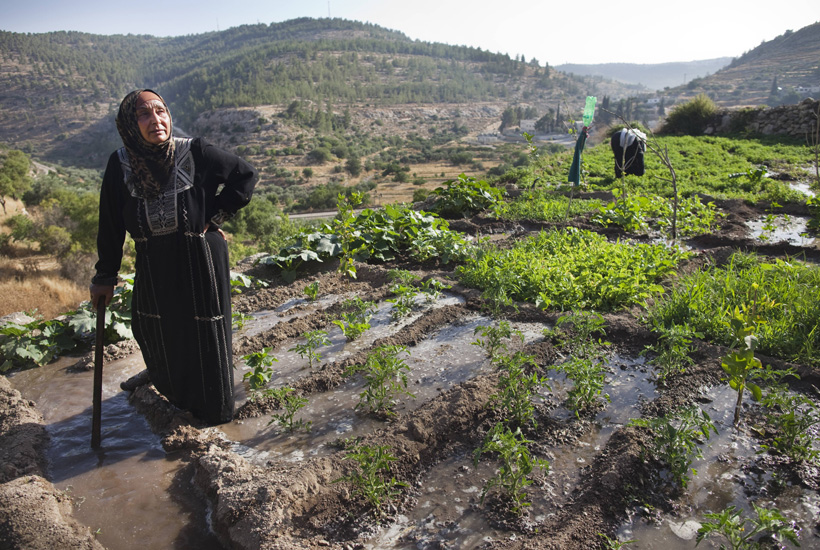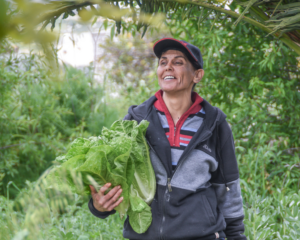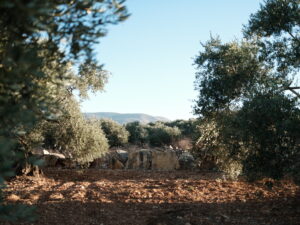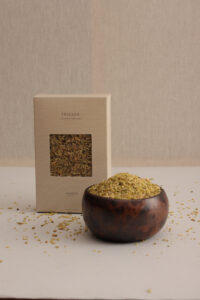Journalist Melinda Tuhus visited Canaan and the PFTA during the 2011 olive harvest and festival and filed this report in the July/August 2012 edition of Emagazine.
Forging New Connections for Palestinian Farmers
Palestine Hopes to Make Its Mark as the Home of World-Class, Organic Olive Oil
July 1, 2012 | Melinda Tuhus |
To qualify as extra-virgin olive oil,
which brings the highest price, farmers
must harvest their olives by hand.
© iStockphoto
The annual harvest festival falls in early November outside the northern West Bank city of Jenin, Palestine. Hundreds of farmers and their families come out to celebrate the end of another season of organic, fair trade, extra virgin olive oil production. It’s their livelihood, and it has improved markedly since the Palestine Fair Trade Association organized the farmers into cooperatives to help increase their incomes.
In Palestine’s occupied West Bank, 80% of the cultivated land is planted with olive trees. The association has organized 1,700 marginalized farmers into 43 cooperatives in the West Bank. These farmers used to sell their olives for less than it cost them to harvest them. Now they process them through a state-of-the-art olive press imported from Italy. It’s all part of the association’s plan to brand Palestine as the home of world-class olive oil, explains olive press manager Ahmed Abu Farha as he gives a group of Palestinians and foreigners a tour.
Our olive press cold presses the olives without heat, without using hot water in order to maintain the high quality of the product, and it also uses nitrogen; the idea is to prevent oxygen in the air from oxidizing the product,” he says. “To qualify as extra-virgin olive oil, which brings the highest price, farmers must harvest their olives by hand, not with rakes, and transport them immediately to the press in special containers that prevent bruising.”
Nabali Olive Oil
© Canaan
Fair Trade
Olive Oil
The farmers sell most of their oil to the association, which brands it as Canaan Fair Trade, but keep some for their own use. Last year the co-op exported 450 metric tons of extra virgin olive oil to Europe, North America, Australia, Japan and Korea. The lower quality oil that doesn’t make the grade is sold to make Dr. Bronner ‘s Magic Soaps, an organic, fair trade staple at natural food stores.
Hasan Kamel Samar, one of the co-op member farmers, harvests 400 olive trees in a village near Jenin. Through a translator he says that he makes more money now selling olives to the Fair Trade association. He planted all his trees, now between 15 and 18 years old. “The people here [in the association] are very nice and they treat the farmers very well,” he says. “And they give scholarships to the children of the farmers.”
All the guests walked around the grounds or sat under olive trees decorated with bold cloth sashes, eating plump pita bread soaked in olive oil, encrusted with spices and topped with hummus—another signature Palestinian food. They listened to a band whose singer belted traditional songs in Arabic, and cheered as the names of the scholarship winners were announced.
Hasan Kamel Samar, an olive farmer
in one of the cooperatives run by the
Palestine Fair Trade Association.
© Melinda Tuhus
The Palestine Fair Trade Association is the brainchild of Nasser Abu Farha (Ahmed’s uncle), who was educated at the University of Wisconsin. In 2005 he started discussing the idea of cooperatives with farmers around the West Bank. “We’ve built a transparent structure where all the cooperatives can participate in decision-making and electing boards,” he says. “We’ve built an organization that transfers power to the communities that have been marginalized, and we cultivate international solidarity and bring it to the hands of these farmers, so we enable them to support themselves and their families. We provide open market access and guide them through our research from what we know about organic farming. The main thing that came out of this is that we created hope among the farmers that there are people who care.”
The olive oil the association sells is stocked on the shelves of high-end stores like Whole Foods in the U.S. and Sainsbury’s in Britain—16 countries in all with sales of $5 million in 2010.
The size of the olives is determined in part by the moisture content in the soil. Since Palestinians receive about a fifth as much water as Israeli settlers in the West Bank, and are not allowed any water for irrigation, Abu Farha says that limits the size of the olives in many places, and many trees die for lack of water. The association gives out 10,000 young trees a year to new farmers or to replace trees lost to cutting, uprooting or burning by the settlers or the Israeli Defense Forces. It is not uncommon, while driving through the West Bank, to see long stretches of olive tree stumps, where once healthy trees were cut down.
© iStockphoto
In addition to olive oil, Canaan Fair Trade produces tahini, couscous, honey, fig spread, candied almonds and cactus sauce. Abu Farha says he wants to keep expanding the variety and quantity of organic, fair trade goods that are produced from the Biblical “land of milk and honey” in order to spread the sustainable income it generates to more Palestinian farmers.
MELINDA TUHUS is a Connecticut-based independent journalist. She writes the Activated blog for E.
JULY 1ST 2012
Forging New Connections for Palestinian Farmers
BY: THE ENVIRONMENTAL MAGAZINE
http://www.emagazine.com/magazine/forging-new-connections-for-palestinian-farmers/





